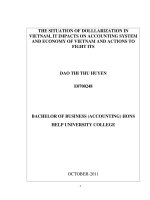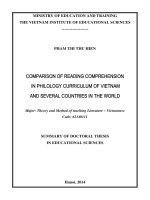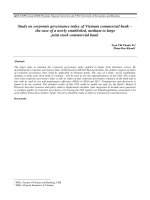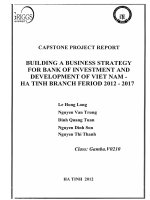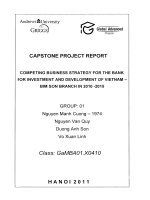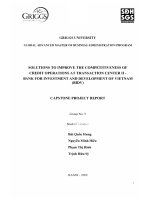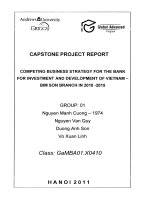family values of vietnam and usa
Bạn đang xem bản rút gọn của tài liệu. Xem và tải ngay bản đầy đủ của tài liệu tại đây (196.38 KB, 11 trang )
Family values and differences in family values between
Vietnam and America
TABLE OF CONTENTS
Part A: INTRODUCTION
Part B: DEVELOPMENT
Chapter 1: Theory background
1.1: History and culture
1.2: Family Values
Chapter 2: Differences in family values of Vietnam and America
2.1: How is family values important?
2.2: Differences in family values between Vietnam and America
2.2.1 Family structure
2.2.2 Status and right
2.2.3 Education on children
Part C: CONCLUSION
Part D: REFERENCES
1
FAMILY
2
PART A: INTRODUCTION
1. Title
Family values and differences in family values between Vietnam and America
2. Reasonable
Being a student of Faculty of English at Hanoi Open university, I am always
interested in discovering other countries’culture as much as I can. Throughout the
lessons of intercultural communication, I have more chances to know custom,
communication ways, and culture of many countries and religions in the world. In
this subject, I pay attention mostly to some differences between Vietnamese and
American, especially in family values. In my thought, family is one of the most
important parts in the lifetime. And this is one of the reasons I choose family values
as the subject of my study. Evey country has differ history which affects to cultural
features of itself. I do this study with hope to understand more about family values
of Vietnam and American. From that point, people can know ways to maintain these
cultural values for the next generation as well as avoid cultural shock.
3
PART B: DEVELOPMENT
Chapter 1: Theory background
1.1 History and culture
Culture is one of thing who influences people. Culture has many synonyms like
habit, costume, tradition, manner and etc. It determines people do anything. Culture
is the abstract thing. It places on their mind. Different of the region determines the
culture. For instance, each people who live on a country have different culture.
Vietnam culture has been shaped by Confician ethics.During thousand years
under the invasion and domination by Chinese, Vietnamese culture was also
permeated by their Confucian philosophical beliefs. In the process, Vietnam have
been influenced by the different cultures in many countries around the world. The
result is a complex cultural mixture very different from the original indigenous
cultures. This portrait indicates that Vietnam is influenced by many beliefs.America
is an immigrant country which means the people uprooted themselves in order to
come to this new land. Therefore, there are many cultural features. Every area in
America has the different customs,beliefs, and features.
History and culture contribute to making the special family values for the two
countries. Both Vietnam and America consider family as the part important in the
life
1.2 Family value
Family values are those which a family shares for the common good of its
members. Family values, sometimes reffer to familial values, are tradiotional or
cultural values(that is values passed on from generation to generation within
families) that pertain to the family’s structure, function, rules, beliefs, attitudes, and
ideals. According to dictionary, “family values” is defined as “ the moral and ethical
principles traditionally uphelp and transmitted within a family as honesty, loyalty,
4
industry, and faith. Values unite the parents and the family while bringing freedom
to its members to pursue happiness, to give and receive love and to know the truth.
These values enrich and guard the intimacy of the family members. These values
are commonly known beacause they are injured within our nature.
Chapter 2: Differences in family values between Vietnam and America
2.1 How is family values important?
Family values have the important roles to the family and its member. These values
are factors and standards affecting to every member in many aspects. Family values
are important on many different levels of the family structure.
Establishing a Foundation for the Family
A foundation supports a family. When crises arise, the family is able to withstand
them because of the stability of the relational structure. Families with defined values
are able to stand strong on their views despite other people's efforts to break through
with opposing beliefs. In addition, when family members feel weak from the cold
outside world, they know they can come into their family for a warm comforting
connection.
Influencing Decision Making
Family values influence the decisions people make both within the family
structure and outside of it. Making a decision about important topics can be difficult,
and people may feel helpless if they don't know which way to proceed. Therefore,
having solid family values helps people make the right decisions in life.
Guidance for Raising Children
Parenting can be a challenge and with all of the world's influences, it can be
downright scary. Knowing what you believe in as a parent and what you want for
your children will help you raise them to be responsible and conscientious adults.
5
Giving Family Meaning
What does family mean to you? When people think about the definition of family,
they usually say something about feeling connected because they share the same
views of the world. While some family members may differ on views of some
topics, most family members keep the largest, most influential, beliefs intact.
Helping Guide People in Relationships
People usually relate to others who share the same values as them because they
are more compatible with one another. However, to find compatibility you need to
know what you believe in so you know what to look for when looking for a mate or
friend. Families with strong values are able to identify these values in others quickly,
which then produces a new generation with similar beliefs.
2.2 Differences in family values of Vietnam and America
2.2.1 Family structure
In Vietnam:
The Vietnamese household follows the extended multi-generational pattern.
Household average five to seven members but vary greatly in size. A typical
extended family often includes three or even four generations, and typicalling
consisting of grandparents, father and mother, children and grandchildren, all living
under the same roof. Sometimes, parents have more than one married son living
with them, but this often lead to such tension that it is generally held preferable for a
second son to live separately.
In America:
The traditional family structure in the United States is considered a family support
system involving two married individuals providing care and stability for their
biological offspring. However, this two-parent, nuclear family has become less
prevalent, and alternative family forms have become more common. The family is
created at birth and establishes ties across generations.Those generations,
6
the extended family of aunts, uncles, grandparents, and cousins, can hold significant
emotional and economic roles for the nuclear family.
Over time, the traditional structure has had to adapt to very influential changes,
including divorce and
the
introduction
of single-parent
families, teenage
pregnancy and unwed mothers, and same-sex marriage, and increased interest
in adoption. Social movements such as the feminist movement and the stay-at-home
father have contributed to the creation of alternative family forms, generating new
versions of the American family.
2.2.2 Status and right
In Vietnam:
In the patiarchal society, the husband was considered the head of the family, had
all rights and decisions for the family. They did not need to do anything but make
money. The wife and Vietnamese women had limited rights and took a secondary
place in the family. Women were brought up according to a strict discipline and
traditionally less educated than men. The usually did not enter the job market
outside the home. They completely depent on their husband, performed all
household tasks and took care of children. In that years, the family and society were
seriously influenced by these words: “to value men above women”. As a result,
when a wife gave birth of girl, she could be disregarded by the family of her
husband and even by her husband. A couple of husband and wife was forced to
have a son for the next generation and to worship ancestors. If they did not, that did
mean they had no word in the huge family.
The roles of women in Vietnamese family have been changed throughout the
history of Vietnam. There are more balanced between men and women. Today,
women can making money and have rights of decision in the family and society.
Men is also responsible for household chores and taking care of children. However,
in some family , the erroneous conceptions about rights of women are still
maintained.
7
In America:
In America, the rights between husband and wife is more equal. Both women and
men have the same rights in making decisions, doing works and making money in
the family. Sometimes, women make more money than men. The concept of family
life is that both the husband and wife must share the burden. Housework and caring
for children are no longer the work of women by themselves. Men are also
responsible for helping women with these tasks. Many women is not only good at
work in the family but also in social works.
2.2.3 Education on children
In Vietnam:
Vietnames parents protect their children so carefully which make their children
mostly depend on them. They let their children sleep with them even when they are
not the small children. Whatever their children want, they always support and do for
them.
Obedience and respect is the traditional virtues which Vietnamese children are
taugth to exhibit in the family. Discipline and physical punishment are acceptable
remedies for disobedience in the Vietnamese tradition. Harsh discipline and
beatings do not constitute the abuse of a child but its reverse: loving care, concern,
and attention. When parents are old, children are expected to take care of them to
compensate for the gift of birth and upbringing. They are supported by married or
unmarried children until they die.
Vietnamese parents have a high regard for education. It is considered a way for
familya advancement. Parents encourage their children to study and excel in their
education. However, they have a trend to force their children to learn major or
school their parents like or which they think its effection.
After marriage, Vietnamese children often live with their parents until they die.
8
In America:
American parents teach their children sense of independence. As soon as born,
children are arranged for their private room,separately from their relatives. It is
believed to help children avoid depend on members in the family. When they are
two years old, parents teach their own self-serving skills such as taking food,
drinking water or milk, playing by themselves and getting up on their own. Parents
and teachers always perserve, both guide and motivate to creat self-reliant routines
for the child until he or she is able to practice them well. They argue that grasping
the basic skills of self-serving needs will help children improve their independence
and sense of maturity. Children can “leave the nest” at an early age and live an
independent life. This independence from parents is not an indication that parents
and children do not love each other. Strong love between parents and children is
universal and there is no exception in America family.
When children make mistakes, parents do not use whips. Instead of scolding and
beating, American parents punish their children with more positive and rational
actions.
American parents always respect opinions and hobbies of their children. It is
thought that fobbidance can limit their creativity. But they will ban if that idea are
wrong. With this education, American children will have more opportunities to
express their personality. They have high regard for education but they let their
children make decisions about their study by themselvese.
After marriage, American children have private life. They do not live with their
parents and look after their life by themselves.
9
PART C: CONCLUSION
Family is an important part in the life. Family values contibute to build the perfect
famlily as well as personality of members. This paper help dicover partly the typical
features and differences between Vietnames and American family. The similarities
and differences are found to help people from the two cultures establish and
maintain effective communication and avoid misinterpretations, misunderstading, or
cultural shock.
10
PART D: REFERENCES
1. Di, Y. H. (2001), American Culture. Changchun: Jilin Science & Technology
Press.
2. Musgrove, F. (1966), The Family Education and Society. London: Routledge &
Kegan Paul.
3. Wu, F. (2003), American Society and Culture. Wuhan: Wuhan University Press.
4. Zhu, Y. T. (1997), The Society and Culture of Major English-Speaking Countries.
Beijing: Higher Education Press.
5. />6. />7. />8. />
11


